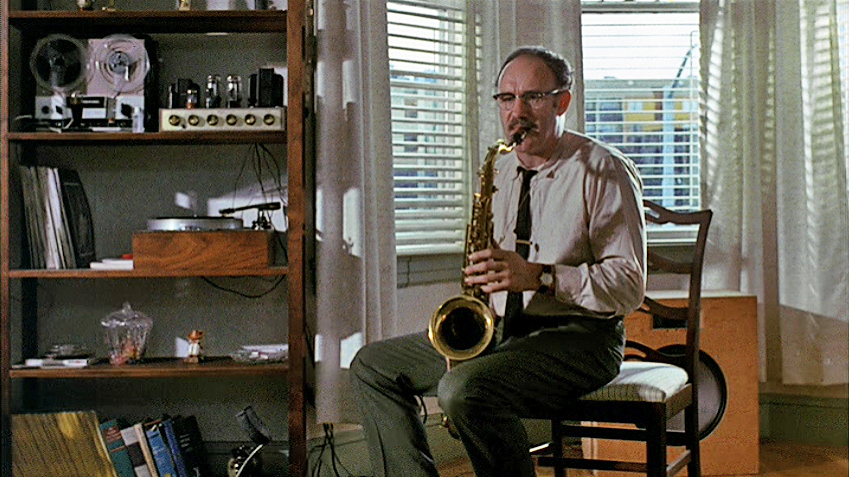The Conversation, directed by Francis Ford Coppola, is a disturbing and detail-specific paranoid thriller. It is not an epic adventure like Apocalypse Now, nor a wide-ranging family drama like The Godfather. Instead, it comes across as a small and personal movie. It was financed by Paramount and released in 1974. But if The Conversation were produced in the current day and age, it would not be a studio movie at all—it would definitely be an indie. It might even be called a contained thriller, given how few set pieces and little action is involved.
The movie stars Gene Hackman as Harry Caul, a surveillance expert for hire. Interestingly, Hackman essentially reprised the general character of Caul years later in Enemy of the State (a thriller which I’ve already written an article about). His character is portrayed with an excellent sense of verisimilitude. He is a man who has become extremely paranoid and hyper-technical and detail oriented due to his line of work (or perhaps was already paranoid and hyper-technical and found his line of work on account of his personality). Either way, this is portrayed specifically through the film—from the sophisticated electronic equipment he uses, the safeguards he utilizes to keep his life private and his apartment safe, and the exacting detail in which he extracts audio information from surveillance sources.
In the end, what helps separate the movie from the general “conspiratorial” froth is that one of the fundamental conflicts is between Harry and himself. Harry, the “surveillance expert,” functions with one moral code. But he is also a human who likes to play the saxophone, feels bad about holding back from his girlfriend, and is worried about his work causing the death of one or more of his targets.
The movie holds up very well today, but also must be understood in context to its time. It was released right around the Watergate episode, and this was also a period in American history where the ability of technology to enable everyone from consultant-based “dirty tricks” squads to nation-state spies was exploding into the public view. Part of this discourse was the gap between what the public didn’t know, what they thought was possible, and what was actually possible. One of the reasons that I admire The Conversation is that it was, apparently, extremely well-researched by Coppola. Thus, the technology used is not all-seeing and all-hearing—at odds, perhaps, with the perception of the day.
It was not possible to just turn on a piece of equipment and hear a perfect conversation stream into a tape from a target across a street. That’s why the opening scene of the movie, as well as the resulting piecing together of audio that Harry must do later, is so incredible. It embraces reality at the expense of speedy exposition. And even more than that; it provides drama. That’s one of the most impressive aspects of this movie. Who would have thought that it would be dramatic watching Gene Hackman piece together audio by slowly but surely stripping away tiny wavelengths of sound? This scene contains zero physical action beyond the turning of dials and yet it is entirely and deeply thrilling.
One of the lessons from The Conversation that still holds water today is, in fact, the difficulty of surveillance—as opposed to the prevailing belief that it must be easy for any and everyone to spy on us. It is still hard, and it is definitely still filled with much psychological complexity for the operators and agents involved. When one watches a movie such as The Conversation, one realizes how much of a cop-out it is for a modern movie to simply show a briefing with “surveillance footage” in the background—acquiring that footage could make up an entire film in and of itself!
That brings me to the real meat of the movie. First, the plot is appropriately twisty and well-constructed. A paranoid thriller always relies on a hook to pull the viewer in (in this case, it is the line, “He’d kill us if the got the chance.”), and at least one or two substantial twists to throw everyone askew in the second and third acts. I won’t describe the actual plotting in order to keep it a surprise, but suffice to say that this movie provides plenty of required turns.
But as usual, an excellent thriller will transcend its plot when it comes to why it must be watched. As was touched upon earlier, the real reason that The Conversation works so well is Hackman’s character of Harry. And although his characterization is good, what is the best is the emotional upheaval that eventually affects him. Ultimately this is a man who is undone by his own profession—his own code of existence. There is an inevitability about this result throughout the film, a sense that the cracks are forming. And at the end, when he realizes that he’s been had and also may be under surveillance himself, he cracks completely.
One of the final scenes of the movie can be played here without giving much away. But just imagine how a completely buttoned-up and under control man in the beginning of this film becomes this wreck by the end. That journey is why The Conversation easily enters the halls of the best paranoid thrillers ever made.




